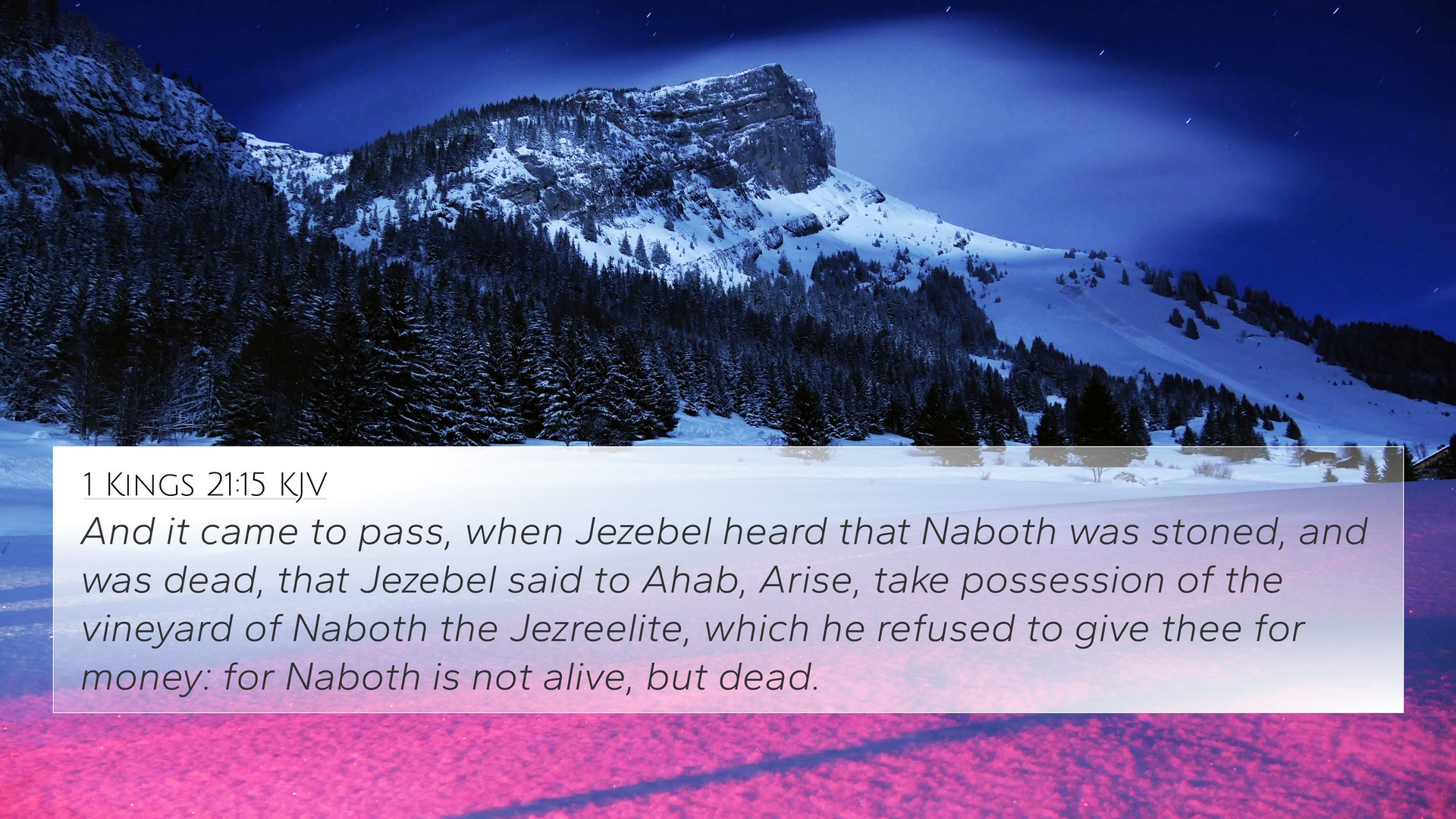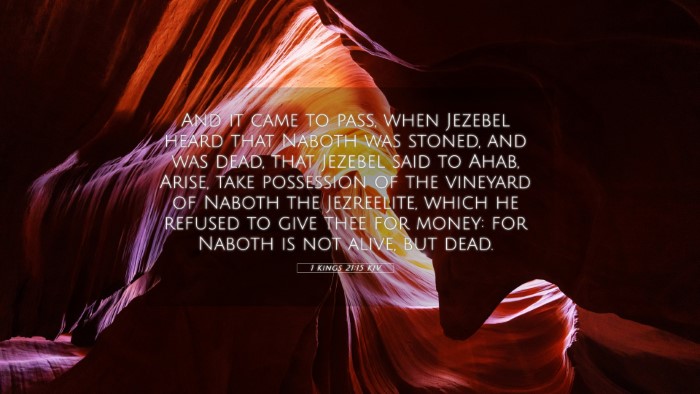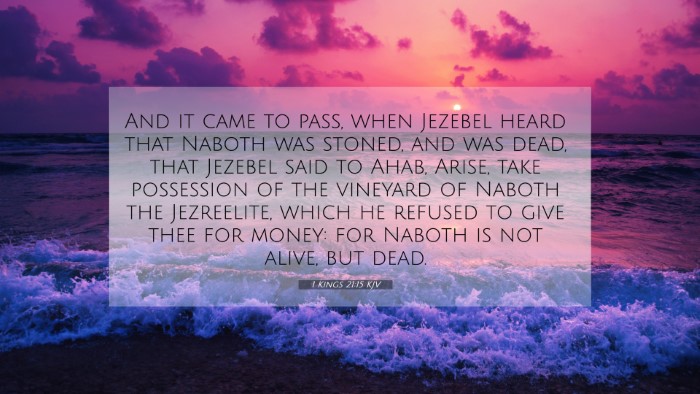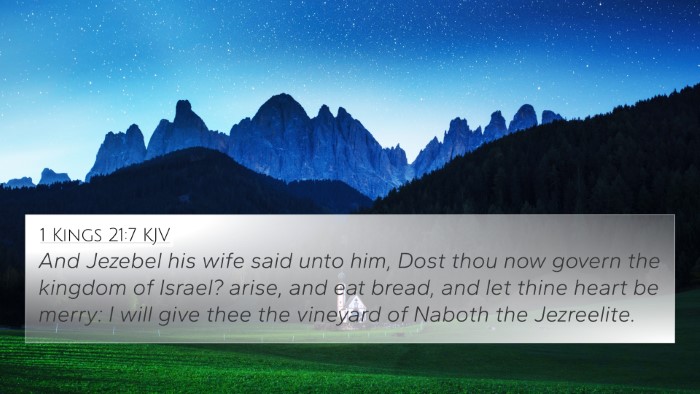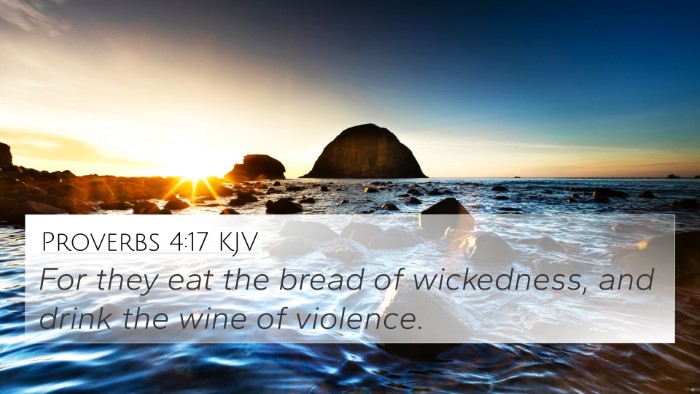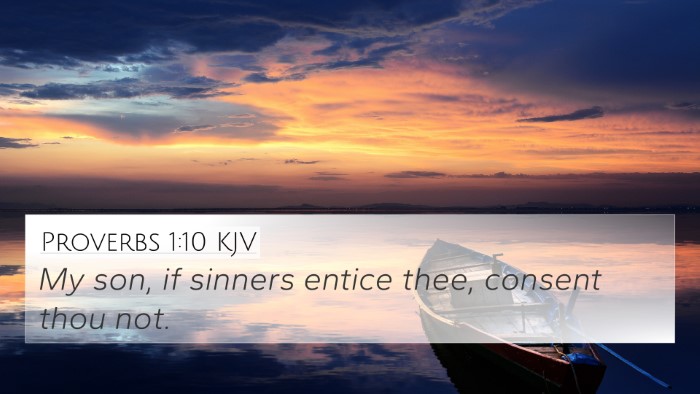Understanding 1 Kings 21:15: A Comprehensive Bible Verse Analysis
The biblical verse 1 Kings 21:15 states:
"And it came to pass, when Jezebel heard that Naboth was stoned, and was dead, that Jezebel said to Ahab, Arise, take possession of the vineyard of Naboth the Jezreelite, which he refused to give thee for money: for Naboth is not alive, but dead."
This verse captures a significant moment in the narrative of King Ahab and Queen Jezebel's reign over Israel. To provide a deeper understanding, we can explore insights from various public domain commentaries including those of Matthew Henry, Albert Barnes, and Adam Clarke.
Summary of Insights
-
Matthew Henry's Commentary:
Matthew Henry highlights the cunning and ruthlessness of Jezebel as she seeks to fulfill her husband's desires through manipulation and murder. He emphasizes the moral depravity involved in the act, portraying Jezebel as a personification of wickedness and ambition that disregards the law of God.
-
Albert Barnes' Notes:
Barnes notes the fulfillment of Jezebel's plot to secure Naboth's vineyard. He reflects on the cold-hearted nature of the royal couple, showing that their desire for material gain overcame any sense of justice or mercy. His commentary discusses the implications of Naboth’s death, revealing the societal consequences of such tyranny.
-
Adam Clarke's Commentary:
Clarke provides a historical context, linking Naboth’s faithfulness to God's law with the drastic measures Jezebel took. He underlines the impact of this event on Israel's moral state and hints at the ensuing judgment that would come upon Ahab and Jezebel due to their actions.
Connections and Themes
The verse encapsulates themes of power, corruption, and divine justice that ripple throughout the Bible. The connections between 1 Kings 21:15 and other scriptures deepen our understanding of its significance:
- 1 Kings 21:14: This verse reveals the full extent of Jezebel's scheme against Naboth.
- 2 Kings 9:36-37: The prophecy of judgment upon Jezebel due to her actions is fulfilled here.
- Deuteronomy 19:16-21: Discusses the laws against false witnesses and murder, relevant to the injustice faced by Naboth.
- Micah 2:1: Condemns those who devise iniquity and work evil upon their beds, relevant to Jezebel’s character.
- James 5:1-3: Warns the rich about their impending judgment, paralleling Ahab's desire for material possessions.
- Isaiah 5:20: Speaks to the inversion of good and evil, reflecting the moral confusion presented in this account.
- Matthew 23:37: Alludes to Jerusalem’s history of rejecting the prophets, drawing a parallel to Naboth’s unjust fate.
- Revelation 2:20: Contemplates the legacy of Jezebel as a symbol of seduction and leading others astray.
Applying Cross-References
Using bible verse cross-references, we can identify thematic connections that inform our understanding of 1 Kings 21:15. Here's a framework for how to engage with biblical texts:
- Identify thematic links: Look for shared themes such as justice, retribution, and authority.
- Utilize a Bible concordance: This tool aids in locating verses and understanding their contexts.
- Practice comparative bible verse analysis: By examining multiple verses, one can gain insight into God’s overarching narrative.
- Explore secondary keywords: Finding verses that relate to the themes of manipulation and ambition can enrich understanding.
- Engage in inter-biblical dialogue: Understand how New Testament teachings reflect on Old Testament narratives.
Conclusion
In conclusion, 1 Kings 21:15 serves as a powerful reminder of the consequences of sin, the depths of human depravity, and the ultimate justice of God. By employing tools for cross-referencing biblical texts, one can uncover deeper meanings and connections within the scriptures, enriching one’s understanding and faith.
Further Study Suggestions
Here are a few methods for exploring biblical texts further:
- Cross-reference Bible study: Regularly utilize a cross-reference Bible study method to uncover thematic relationships.
- Bible chain references: Trace themes or events through chains of related scriptures.
- Utilize comprehensive Bible reference resources: Help broaden understanding by cross-examining various passages.
